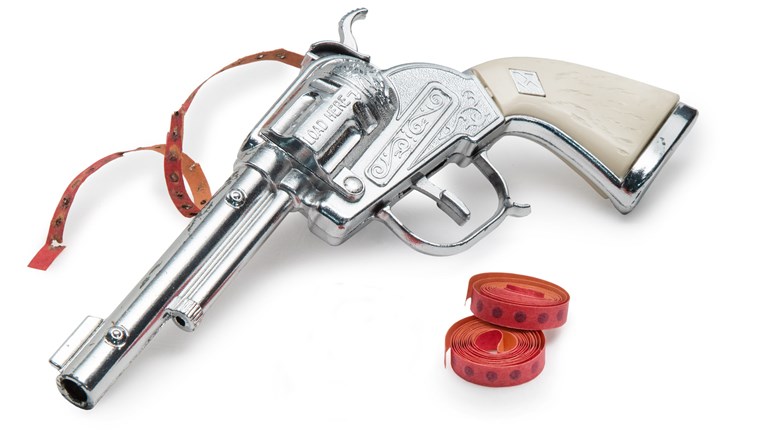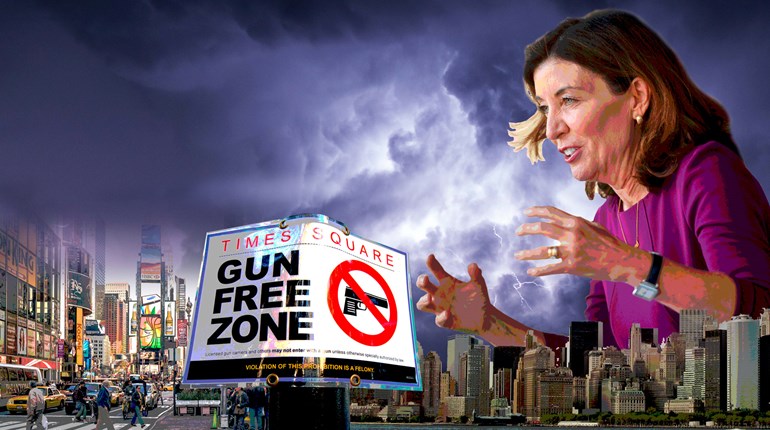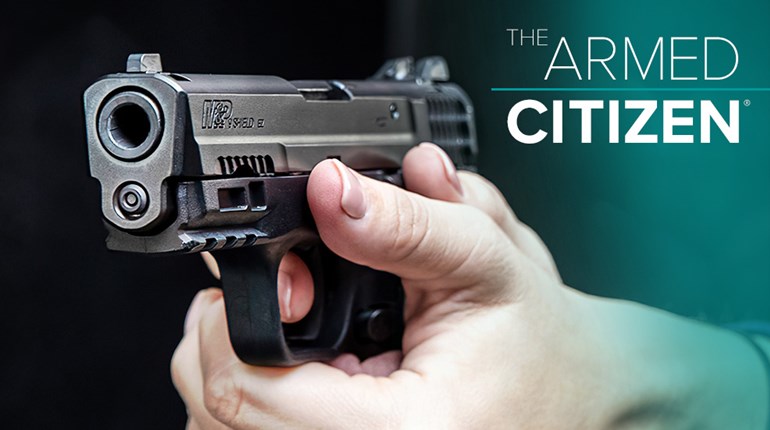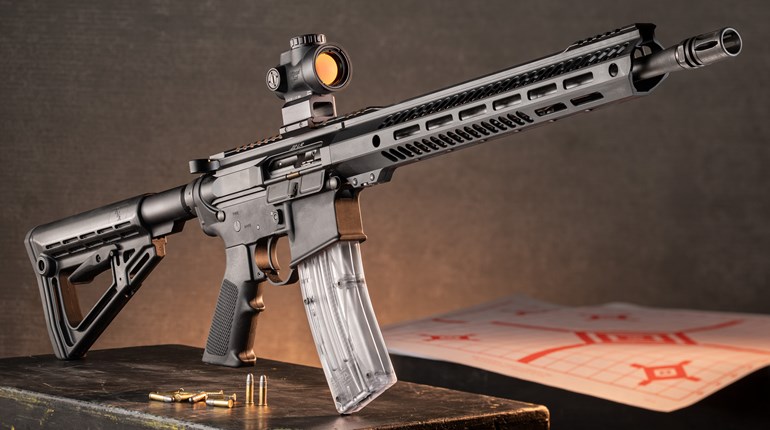
In a last-minute “budget-trailer bill,” California’s legislature passed, and Gov. Gavin Newsom (D) signed, a mandate that the state give gun-owners’ personal data to the University of California Firearm Violence Research Center (UCFC) at UC Davis.
The UCFC was created by the state of California in 2017 and is funded by the state. It is, effectively, a state-run gun-control group that focuses on creating advocacy “research” to substantiate anti-Second Amendment activists’ claim that gun ownership is a “disease” that needs to be “cured” with gun control.
It is not one-sided to call UCFC a gun-control advocacy group, as the “About Us” section of its website says, “UCFC is dedicated to its role in policy development …” and its research primarily argues that guns need to be further banned and restricted.
This detailed, personal data on California’s legal gun owners—down to Social Security numbers—that the UCFC could now be getting (this legislation went into effect as soon as it was signed into law) and sharing with affiliated groups has long been sought by Garen J. Wintemute, M.D., the director of UCFC. Wintemute is a staunch gun-control advocate.
The NRA has been lobbying against this massive mining of private data; in fact, legislation written to give this data to UCFC had been stalled in committee. But legislators quietly added it to a budget-trailer bill, which is legislation that comes after a basic budget framework has been passed. A budget-trailer bill specifically allocates funds and explains the details of the budget.
“This legislation [Assembly Bill 173] was nothing more than a placeholder budget bill until it received massive changes over Labor Day Weekend prior to the final week of session. It was promptly scheduled for a hearing on the Tuesday after the holiday, where it was one of more than a dozen budget-trailer bills; this process is basically a rubber stamp for the party in power; it’s not a time when we can get a robust policy discussion. Because of this ramrodding, and the severe limits California places on debating these bills, the legislature was able to successfully abuse the process to shred the privacy rights of gun owners,” says Daniel S. Reid, western regional director for the NRA’s Institute for Legislative Action.
This process can, unfortunately, be used in this way. The California constitution requires the legislature to pass a budget by June 15, but the constitution is silent on how detailed that budget has to be. So, lawmakers passed a placeholder in mid-June, authorizing the state to spend an unprecedented amount of money, but without offering much in the way of specifics. Then the backroom talks took place. As a result, this particular bill represents weeks of negotiations between the governor and legislative leaders, all Democrats. Then came the trailer bills—highly detailed measures that direct how to actually spend all that money. (Don’t spend too much time wondering what was exchanged for what in this process. Last-minute budget fiddling within one party that’s entirely in control isn’t all that much about compromise.)
So, just like that, legislation upending the privacy rights of Californians was railroaded through without real debate. Unfortunately, the Left doesn’t mind this use of secrecy and power when it suits its interests. Sure, The Washington Post chose as its mantra “Democracy dies in darkness,” but when it comes to secret backroom deals pushing the Left’s policies, such as this, the Post, the Los Angeles Times and other mainstream-news outlets haven’t complained and probably won’t. It simply doesn’t bother the Left that this legislation creates grave privacy concerns for the state’s gun owners, because this private information will likely be used to create “research” to push gun-control policies.
What’s This All About?
So, what is the California Firearm Violence Research Center?
The UCFC’s director, Dr. Wintemute, is a physician who thinks that guns are a disease that needs to be treated with a heavy dose of gun control. So, while the top of its webpage calls itself the “Violence Prevention Research Program,” when you read through the site and its “research,” you realize that only one type of violence concerns them—that committed with guns.
Their stated goals include studying: “The nature of firearm violence … . The individual, community and societal consequences of firearm violence. Prevention and treatment of firearm violence at the individual, community and societal levels.” A neophyte to this subject might think, after reading this web page, that violence in America is strictly a gun issue and that criminals are never stopped by good citizens with guns.

California’s ruling elites use public money to fund the UCFC instead of looking into the larger problem of violent crime and the law-breakers who commit crimes, because they want to create justifications for their preferred policies. To win the argument, they need “research” that is politicized, as an honest analysis of the problem would force them to target criminals, not the millions and millions of law-abiding gun owners in America.
As a result, they don’t like how, in 1996, the U.S. Congress directed that: “None of the funds made available for injury prevention and control at the Centers for Disease Control and Prevention (CDC) may be used to advocate or promote gun control.”
This seems simple enough: Taxpayers should not be forced to fund political lobbying from a government agency. But this clearly stated restriction is often misrepresented by gun-control advocates, such as by President Joe Biden (D) and many in the mainstream media, who argue this restriction on political advocacy is a ban on research into this entire subject.
It’s not.
Former Rep. Jay Dickey (R-Ark.), after whom this provision is named, stated in 2018 that the Dickey Amendment does not prohibit research into this area. “It just couldn’t be the collection of data so that they can advocate for gun control. That’s all we were talking about,” he said.
Despite the Dickey Amendment, the CDC refuses to engage solely in non-advocacy research as taxpayers want. Dr. Rochelle Walensky, the director of the CDC, for example, while carefully parsing her words to stay just inside the legal boundaries, wants her agency to treat guns as a “public-health crisis.” She told CNN, “Now is the time—it’s pedal to the metal time.” That outlook is certainly convenient for the Biden administration’s incessant desire for “research” to prop up more gun-control policies.
You might think the CDC would have its hands full right now fighting a disease causing hundreds of thousands of deaths, but, in the Biden administration, gun-control politics take precedence.
So, is it even possible to do non-advocacy research in this area? Yes. I was pleased and surprised to find a 2008 study that examined when gun shows took place in California and Texas, and then looked for evidence that homicides or suicides increased in the aftermath of those gun shows (nber.org/papers/w14371). The authors (one of whom has published articles broadly hostile to gun ownership) examined homicide and suicide statistics for the week following gun shows in the surrounding zip codes and compared this data to weeks when no gun show took place. They found that in California, there was a statistically significant, but still very small, increase in gun suicides in the week following a gun show. In each of the years 1994 through 2004, they concluded that the entire state of California experienced four additional gun suicides because of gun shows. They also acknowledged that “this increase is offset entirely by an almost identical decline in the number of non-gun suicides, suggesting that gun shows influence the method but not the number of suicides.” They also found “no evidence to suggest that gun shows increased the number of homicides in California during our study period.”
In Texas, meanwhile, they found “that in the two weeks following a gun show, the average number of gun homicides declines in the area surrounding the gun show. Aggregating across all gun shows in the state, we find that there are approximately 16 fewer gun homicides resulting from the 200 gun shows in the average year.” And they found no statistically significant effect on suicides or non-gun homicides from gun shows. The authors emphasized that this reduction, while statistically significant, was extremely small. (Unsurprisingly, Wintemute, director of the UCFC, called this study “fatally flawed.”)
So, yes, pure research with no advocacy for gun bans can be done; the problem for the gun-control Left is the results won’t be very useful to their policy goal of banning guns.
So, with the CDC currently out of the biased gun-research business, legislators in Sacramento decided to create the UCFC to do the biased research in California. They then decided to give the UCFC information that can identify individual gun owners—a blatant privacy-rights infringement.
Where Will This Lead?
First of all, the work from these supposed “researchers” is unlikely to be all that honest, but they will insist “we have data to back up our claims.” Elected representatives with certain politics will be bolstered by these claims and most national news outlets will parrot these biased studies without trying to verify their accuracy or seeking opposing points of view.
Now, to give this some context, imagine if California’s government released abortion or gender-
reassignment records from California’s Medi-Cal system (California’s somewhat-more-generous version of Medicaid) to a research organization on the cross-my-heart promise they wouldn’t release any data that can identify individuals. Or how about lists of people who didn’t pay their state taxes?
And even if the groups that get this personal information have the best intentions, will this computer data really be secure? Hackers have broken into large corporations, utility companies and even the Pentagon. Researchers with an ax to grind might even leak this personal information to gun-control groups with the goal of embarrassing, harassing or annoying gun owners. This data, after all, could allow a group to create an accurate list (down to names, addresses and personal characteristics) of legal gun owners in California.
The state of California might even accidently release this information—that has happened before. In 2016, the California Department of Justice (DOJ) Privacy Office inadvertently disclosed the names, dates of birth and California Driver’s License and/or Identification Card numbers of potentially every single DOJ-certified Firearm Safety Instructor in California to an unknown requestor.
If someone doesn’t think activists would target California’s gun owners, they should be reminded that after California voters passed an initiative that defines marriage as “one man, one woman” in 2008, people who contributed money (sometimes very small amounts) to that effort lost jobs, received death threats and even got envelopes containing a powdery white substance. Publicly available records were used to find and harass those individuals.
Here’s one more nefarious way this gun-owner data could be used: If you were a criminal organization seeking guns, might you be interested in a list of gun owners? Or, maybe you’d like to know who doesn’t have a gun?
The possible illicit uses of this information are many and frightening. And those who could be targeted are hardly all Republicans or some other group; gun owners are a large, diverse cross-section of America. The Second Amendment is, after all, an individual right that is specifically protected within the U.S. Bill of Rights for all of us.
As this was being written, the NRA was considering filing a lawsuit to protect citizens’ privacy. But meanwhile, Wintemute, the director of UCFC, likely already had his team moving to grab and use this personal data on law-abiding gun owners so they can advocate for more gun-control restrictions in the state of California and, since what happens in California doesn’t stay in California, throughout America.
Clayton E. Cramer teaches history at a community college in Idaho that prefers anonymity.


































